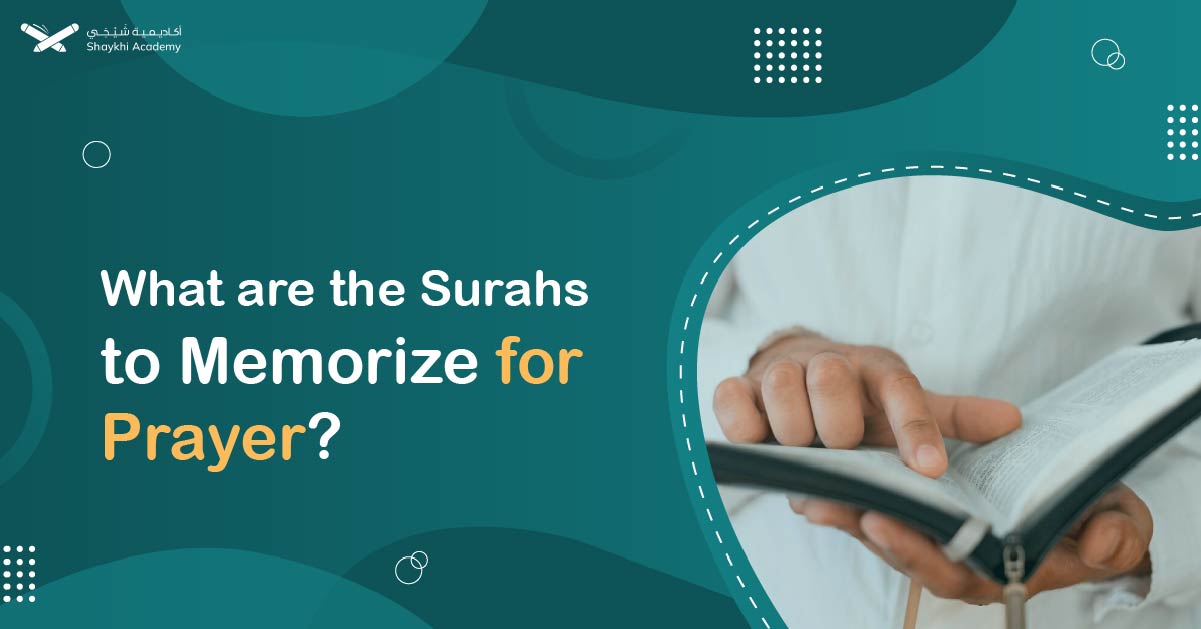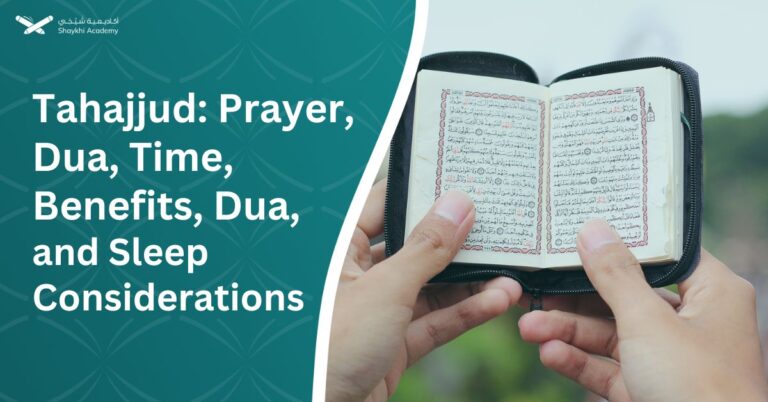Memorizing Surahs for prayer is essential in Islam, fostering a deeper connection with Allah and ensuring correct Salah performance. Surahs like Al-Fatihah, Al-Ikhlas, Al-Falaq, and An-Nas, commonly recited during prayer, emphasize protection, praise Allah’s Oneness, and highlight kindness. These short Surahs are integral to prayer routines and are taught in children’s Quran memorization courses to help them fulfill their prayer.
The Quran holds profound importance in the life of a Muslim, especially in the context of prayer. It is considered the literal word of Allah, revealed to Prophet Muhammad (peace be upon him) as a guide and mercy for humanity.
In the Islamic faith, prayer is a fundamental act of worship and a means of establishing a direct connection with Allah. The Quran serves as a source of guidance, inspiration, and spiritual nourishment for Muslims during their prayers.
Usually, experts recommend Quran memorization courses such as the Hifz Quran course at Shaykhi Academy to memorize the Surahs we’ll discuss, and more.
Surahs to Memorize for Prayer:
Memorizing Surahs holds significant importance in the practice of prayers (Salah) for Muslims. It allows them to recite these verses directly from memory, enhancing the spiritual experience and connection with Allah during prayer.
Memorization also ensures that the prayer is performed correctly and with focus, as the recitation of specific Surahs is an essential part of the prayer ritual.
Most of the Surahs listed here are easy to be memorized by kids due to their length, which is why you’d find many of these Surah on the curriculum of Quran memorization courses for kids such as Shyakhi Academy’s.
1- Surah Al-Fatihah (سورة الفاتحة):
This is the opening chapter of the Quran and is recited in every unit of the prayer. It is known as the “Essence of the Book” and is essential for prayer.
The Surah in Arabic: بِسْمِ اللَّهِ الرَّحْمَـٰنِ الرَّحِيمِ ١ الْحَمْدُ لِلَّهِ رَبِّ الْعَالَمِينَ ٢ الرَّحْمَـٰنِ الرَّحِيمِ ٣ مَالِكِ يَوْمِ الدِّينِ ٤ إِيَّاكَ نَعْبُدُ وَإِيَّاكَ نَسْتَعِينُ ٥ إِهْدِنَا الصِّرَاطَ الْمُسْتَقِيمَ ٦ صِرَاطَ الَّذِينَ أَنْعَمْتَ عَلَيْهِمْ غَيْرِ الْمَغْضُوبِ عَلَيْهِمْ وَلَا الضَّالِّينَ ٧
Transliteration: Bismillāhir-Raḥmānir-Raḥīm. Al-ḥamdu lillāhi rabbi l-ʿālamīn. Ar-Raḥmānir-Raḥīm Māliki yawmi d-dīn. Iyyāka naʿbudu wa iyyāka nastaʿīn. Ihdinā ṣ-ṣirāṭa l-mustaqīm. Ṣirāṭa alladhīna anʿamta ʿalayhim ghayri l-maḡḍūbi ʿalayhim walā ḍ-ḍāllīn.
Translation: In the name of Allah, the Most Gracious, the Most Merciful. Praise be to Allah, the Lord of all the worlds. The Most Gracious, the Most Merciful. Master of the Day of Judgment. You alone we worship, and You alone we ask for help. Guide us to the straight path. The path of those upon whom You have bestowed favor, not of those who have evoked [Your] anger or of those who are astray.
2- Surah Al-Ikhlas (سورة الإخلاص):
This is a short chapter that emphasizes the Oneness of Allah. It is equivalent to one-third of the Quran and is highly recommended to be recited in prayers.
The Surah in Arabic: قُلْ هُوَ اللَّهُ أَحَدٌ ١ اللَّهُ الصَّمَدُ ٢ لَمْ يَلِدْ وَلَمْ يُولَدْ ٣ وَلَمْ يَكُن لَّهُ كُفُوًا أَحَدٌ ٤
Transliteration: Qul huwa Allāhu aḥad. Allāhuṣ-ṣamad. Lam yalid wa lam yūlad. Wa lam yakun lahu kufuwan aḥad.
Translation: Say, “He is Allah, [who is] One, Allah, the Eternal Refuge. He neither begets nor is born, Nor is there to Him any equivalent.”
3- Surah Al-Falaq (سورة الفلق):
This chapter seeks refuge in Allah from the mischief of created things, particularly from the darkness of the night. It is recommended to be recited in the morning and evening prayers.
The Surah in Arabic: قُلْ أَعُوذُ بِرَبِّ الْفَلَقِ ١ مِن شَرِّ مَا خَلَقَ ٢ وَمِن شَرِّ غَاسِقٍ إِذَا وَقَبَ ٣ وَمِن شَرِّ النَّفَّاثَاتِ فِي الْعُقَدِ ٤ وَمِن شَرِّ حَاسِدٍ إِذَا حَسَدَ ٥
Transliteration: Qul aʿūdhu birabbi l-falaq. Min sharri mā khalaq. Wa min sharri ghāsiqin iḍā waqab. Wa min sharri naffāthāti fī l-ʿuqad. Wa min sharri ḥāsidin iḍā ḥasad.
Translation: Say, “I seek refuge in the Lord of daybreak From the evil of that which He created And from the evil of darkness when it settles And from the evil of the blowers in knots And from the evil of an envier when he envies.”
4- Surah An-Nas (سورة الناس):
Similar to Surah Al-Falaq, this chapter also seeks refuge in Allah, but specifically from the evil of human beings. It is recommended to be recited in the morning and evening prayers.
The Surah in Arabic: قُلْ أَعُوذُ بِرَبِّ النَّاسِ ١ مَلِكِ النَّاسِ ٢ إِلَـٰهِ النَّاسِ ٣ مِن شَرِّ الْوَسْوَاسِ الْخَنَّاسِ ٤ الَّذِي يُوَسْوِسُ فِي صُدُورِ النَّاسِ ٥ مِنَ الْجِنَّةِ وَالنَّاسِ ٦
Transliteration: Qul aʿūdhu birabbi n-nās. Malikin-nās. Ilāhin-nās. Min sharri l-waswāsi l-khannās. Alladhī yuwaswisu fī ṣudūri n-nās. Mina l-jinnati wan-nās.
Translation: Say, “I seek refuge in the Lord of mankind, The Sovereign of mankind. The God of mankind, From the evil of the retreating whisperer – Who whispers [evil] into the breasts of mankind – From among the jinn and mankind.”
5- Surah Al-Mulk (سورة الملك):
Surah Al-Mulk, also known as “The Sovereignty” or “The Dominion,” is the 67th chapter of the Quran. It consists of 30 verses and is a Makkan Surah, revealed in Makkah.
The Surah emphasizes the sovereignty and power of Allah, the Creator and Sustainer of the universe. It serves as a reminder of the consequences of believing in or rejecting Allah’s signs.
The Surah begins with a declaration of the sovereignty of Allah over the heavens and the earth. It describes how He has created life and death to test which of His creatures are best in deeds.
The Surah highlights the beauty and perfection of Allah’s creation, urging the listener to reflect on the signs of His existence and power in the universe.
6- Surah Al-Kawthar (سورة الكوثر):
This is a short chapter that emphasizes the abundance of blessings from Allah. It is recommended to be recited in prayers.
The Surah in Arabic: إِنَّا أَعْطَيْنَاكَ الْكَوْثَرَ ١ فَصَلِّ لِرَبِّكَ وَانْحَرْ ٢ إِنَّ شَانِئَكَ هُوَ الْأَبْتَرُ ٣
Transliteration: Innā aʿṭaynāka l-kawthar. Faṣalli li-rabbika wanḥar. Innashāni-aka huwa al-abtar.
Translation: Indeed, We have granted you, [O Muhammad], al-Kawthar. So pray to your Lord and sacrifice [to Him alone]. Indeed, your enemy is the one cut off.
7- Surah Al-Kafirun (سورة الكافرون):
This chapter emphasizes the rejection of polytheism and reaffirms the monotheistic beliefs. It is recommended to be recited in prayers.
The Surah in Arabic: قُلْ يَا أَيُّهَا الْكَافِرُونَ ١ لَا أَعْبُدُ مَا تَعْبُدُونَ ٢ وَلَا أَنتُمْ عَابِدُونَ مَا أَعْبُدُ ٣ وَلَا أَنَا عَابِدٌ مَّا عَبَدتُّمْ ٤ وَلَا أَنتُمْ عَابِدُونَ مَا أَعْبُدُ ٥ لَكُمْ دِينُكُمْ وَلِيَ دِينِ ٦
Transliteration: Qul yā ayyuhā l-kāfirūn. Lā aʿbudu mā taʿbudūn. Wa lā antum ʿābidūna mā aʿbud. Wa lā anā ʿābidun mā ʿabadtum. Wa lā antum ʿābidūna mā aʿbud. Lakum dīnukum wa liya dīn.
Translation: Say, “O disbelievers, I do not worship what you worship. Nor are you worshippers of what I worship. Nor will I be a worshipper of what you worship. Nor will you be worshippers of what I worship. For you is your religion, and for me is my religion.”
8- Surah Al-Ma’un (سورة الماعون):
This chapter highlights the importance of kindness and compassion towards others. It is recommended to be recited in prayers.
The Surah in Arabic: أَرَأَيْتَ الَّذِي يُكَذِّبُ بِالدِّينِ ١ فَذَـٰلِكَ الَّذِي يَدُعُّ الْيَتِيمَ ٢ وَلَا يَحُضُّ عَلَىٰ طَعَامِ الْمِسْكِينِ ٣ فَوَيْلٌ لِّلْمُصَلِّينَ ٤ الَّذِينَ هُمْ عَن صَلَاتِهِمْ سَاهُونَ ٥
Transliteration: Ara’ayta alladhī yukaḏḏibu bid-dīn. Fadhālika alladhī yaduʿu l-yatīm. Wa lā yaḥuḍḍu ʿalā ṭaʿāmi l-miskīn. Fawaylun lil-muṣallīn. Alladhīna hum ʿan ṣalātihim sāhūn.
Translation: Have you seen the one who denies the Recompense? For that is the one who drives away the orphan. And does not encourage the feeding of the poor. So woe to those who pray [but] are heedless of their prayer – Those who make show [of their deeds].
9- Surah Al-Qadr (سورة القدر):
This chapter describes the night of decree (Laylatul Qadr), which is better than a thousand months. It is recommended to be recited in prayers, especially during the last ten days of Ramadan.
The Surah in Arabic: إِنَّا أَنزَلْنَاهُ فِي لَيْلَةِ الْقَدْرِ ١ وَمَا أَدْرَاكَ مَا لَيْلَةُ الْقَدْرِ ٢ لَيْلَةُ الْقَدْرِ خَيْرٌ مِّنْ أَلْفِ شَهْرٍ ٣ تَنَزَّلُ الْمَلَائِكَةُ وَالرُّوحُ فِيهَا بِإِذْنِ رَبِّهِم مِّن كُلِّ أَمْرٍ ٤ سَلَامٌ هِيَ حَتَّىٰ مَطْلَعِ الْفَجْرِ ٥
Transliteration: Innā anzalnāhu fī laylati l-qadr. Wa mā adrāka mā laylatu l-qadr. Laylatu l-qadri khayrun min alfi shahr. Tanazzalu l-malā’ikatu war-rūḥu fīhā bi-idhni rabbihim min kulli amr. Salāmun hiya ḥattá matlai l-fajr.
Translation: Indeed, We sent the Qur’an down during the Night of Decree. And what can make you know what is the Night of Decree? The Night of Decree is better than a thousand months. The angels and the Spirit descend therein by permission of their Lord for every matter. Peace it is until the emergence of dawn.
10- Surah Al-Asr (سورة العصر):
This chapter emphasizes the importance of time and the value of good deeds. It is recommended to be recited in prayers.
The Surah in Arabic: وَالْعَصْرِ ١ إِنَّ الْإِنسَانَ لَفِي خُسْرٍ ٢ إِلَّا الَّذِينَ آمَنُوا وَعَمِلُوا الصَّالِحَاتِ وَتَوَاصَوْا بِالْحَقِّ وَتَوَاصَوْا بِالصَّبْرِ ٣
Transliteration: Waal-ʿaṣri. Innal-insāna lafī khusr. Illā alladhīna āmanū wa ʿamilū aṣ-ṣāliḥāti wa tawāṣaw bil-ḥaqqi wa tawāṣaw bissabri.
Translation: By time, Indeed, mankind is in loss, Except for those who have believed and done righteous deeds and advised each other to truth and advised each other to patience.
11- Surah Al-Nasr (سورة النصر):
Surah Al-Nasr is the 110th chapter of the Quran. It was revealed in Madinah and consists of three verses. This Surah speaks about the help and victory that comes from Allah and emphasizes the importance of seeking forgiveness and praising Allah for His blessings.
The Surah in Arabic: إِذَا جَاءَ نَصْرُ اللَّهِ وَالْفَتْحُ ١ وَرَأَيْتَ النَّاسَ يَدْخُلُونَ فِي دِينِ اللَّهِ أَفْوَاجًا ٢ فَسَبِّحْ بِحَمْدِ رَبِّكَ وَاسْتَغْفِرْهُ إِنَّهُ كَانَ تَوَّابًا ٣
Transliteration: Idhā jāa naṣru Allāhi wal-fatḥ. Wa raʾayta n-nāsa yadkhulūna fī dīni Allāhi afwājā. Faṣabbiḥ biḥamdi rabbika wastaghfirhū innahu kāna tawwābā.
Translation: When the victory of Allah has come and the conquest, And you see the people entering into the religion of Allah in multitudes, Then exalt [Him] with praise of your Lord and ask forgiveness of Him. Indeed, He is ever Accepting of repentance.
12- Surah Al-Masad (سورة المسد):
Surah Al-Masad is the 111th chapter of the Quran. It was revealed in Makkah and consists of five verses. This Surah warns about the fate of Abu Lahab, an uncle of the Prophet Muhammad (peace be upon him), who opposed Islam.
The Surah in Arabic: تَبَّتْ يَدَا أَبِي لَهَبٍ وَتَبَّ ١ مَا أَغْنَىٰ عَنْهُ مَالُهُ وَمَا كَسَبَ ٢ سَيَصْلَىٰ نَارًا ذَاتَ لَهَبٍ ٣ وَامْرَأَتُهُ حَمَّالَةَ الْحَطَبِ ٤ فِي جِيدِهَا حَبْلٌ مِّن مَّسَدٍ ٥
Transliteration: Tabbat yadā abī lahabin watab. Mā agnā ʿanhu māluhū wa mā kasab. Sayaslā nāran dhāta lahab. Wa-ommraatuhu hammālat al-ḥaṭab. Fī jīdiha hablun min masad.
Translation: May the hands of Abu Lahab be ruined, and ruined is he. His wealth will not avail him or that which he gained. He will [enter to] burn in a Fire of [blazing] flame. And his wife [as well] – the carrier of firewood. Around her neck is a rope of [twisted] fiber.
13- Surah Al-Takathur (سورة التكاثر):
Surah Al-Takathur is the 102nd chapter of the Quran. It was revealed in Makkah and consists of eight verses. This Surah warns against the distraction of worldly desires and the accumulation of wealth and children, emphasizing that the true measure of success is in the Hereafter.
The Surah in Arabic: أَلْهَاكُمُ التَّكَاثُرُ ١ حَتَّىٰ زُرْتُمُ الْمَقَابِرَ ٢ كَلَّا سَوْفَ تَعْلَمُونَ ٣ ثُمَّ كَلَّا سَوْفَ تَعْلَمُونَ ٤ كَلَّا لَوْ تَعْلَمُونَ عِلْمَ الْيَقِينِ ٥ لَتَرَوُنَّ الْجَحِيمَ ٦ ثُمَّ لَتَرَوُنَّهَا عَيْنَ الْيَقِينِ ٧
Transliteration: Alhākumu at-takāthur. Ḥattā zur tumu l-maqābir. Kallā sawfa taʿlamūn. Thumma kallā sawfa taʿlamūn. Kallā law taʿlamūna ʿilma l-yaqīn. La tarawunna l-jaḥīma. Thumma la tarawunna hā ʿayna l-yaqīn.
Translation: Competition in [worldly] increase diverts you. Until you visit the graveyards. No! You are going to know. Then no! You are going to know. No! If you only knew with knowledge of certainty… You will surely see the Hellfire. Then you will surely see it with the eye of certainty.
14- Surah Al-Qari’ah (سورة القارعة):
Surah Al-Qari’ah is the 101st chapter of the Quran. It was revealed in Makkah and consists of 11 verses. This Surah describes the Day of Judgment as a striking calamity that will overthrow all false pride and establish the true value of deeds.
The Surah in Arabic: الْقَارِعَةُ ١ مَا الْقَارِعَةُ ٢ وَمَا أَدْرَاكَ مَا الْقَارِعَةُ ٣ يَوْمَ يَكُونُ النَّاسُ كَالْفَرَاشِ الْمَبْثُوثِ ٤ وَتَكُونُ الْجِبَالُ كَالْعِهْنِ الْمَنفُوشِ ٥
Transliteration: Al-qāriʿah. Mā al-qāriʿah. Wa mā adrāka mā al-qāriʿah. Yawma yakūnu n-nāsu ka l-farāshi l-mabthūth. Wa takūnu l-jibālu ka l-ʿihnī l-manfūsh.
Translation: The Striking Calamity. What is the Striking Calamity? And what can make you know what is the Striking Calamity? It is the Day when people will be like scattered moths, And the mountains will be like wool, fluffed up.
15- Surah Al-Fil (سورة الفيل):
Surah Al-Fil (سورة الفيل) is the 105th chapter of the Quran. It is a Makkan Surah, revealed in Makkah, and consists of five verses. The Surah tells the story of the people of the elephant and their unsuccessful attempt to destroy the Kaaba in Makkah.
The Surah in Arabic: أَلَمْ تَرَ كَيْفَ فَعَلَ رَبُّكَ بِأَصْحَابِ الْفِيلِ ١ أَلَمْ يَجْعَلْ كَيْدَهُمْ فِي تَضْلِيلٍ ٢ وَأَرْسَلَ عَلَيْهِمْ طَيْرًا أَبَابِيلَ ٣ تَرْمِيهِم بِحِجَارَةٍ مِّن سِجِّيلٍ ٤
Transliteration: Alam tara kayfa faʿala rabbuka bi-aṣḥābi l-fīl. Alam yajʿal kaydahum fī taḍlīl. Waarsala ʿalayhim ṭayran abābīla. Tarmīhim biḥijāratin min sijjīl.
Translation: Have you not considered, [O Muhammad], how your Lord dealt with the companions of the elephant? Did He not make their plan into misguidance? And He sent against them birds in flocks, Striking them with stones of hard clay.
Comprehensive Hifz Quran course for adults.
Whether you’re starting from scratch or looking to improve your memorization, our Hifz Quran course at Shaykhi Academy offers a structured approach to help you memorize the Quran at your own pace.
With the guidance of experienced instructors and a supportive learning environment, you’ll be equipped with the tools and techniques needed to succeed in your memorization journey.
Why Choose Shaykhi Academy?
- Connect with highly qualified native tutors.
- Flexible scheduling to suit your busy lifestyle.
- Affordable classes tailored for all levels.
- Accessible from anywhere around the globe.
Discover Our Range of Courses:
- Arabic Noorani Qaida: Lay a solid foundation for Quranic studies.
- Online Quran Classes for Kids: Engaging lessons for lifelong learning.
- Tajweed Rules for Kids: Learn to recite with confidence.
- Quran Hifz for Kids: Step-by-step guidance to memorize the Quran.
- Quran for Adults: Introduce yourself to Quran reading and Tajweed rules.
- Online Arabic Courses: Master the language of the Quran.
- Islamic Studies: A wide range of topics related to Islam, including theology, law, Quranic studies, Hadith.
Don’t Miss Out on Your Chance to Excel!
Whether you’re a beginner or seeking advanced knowledge, Shaykhi Academy can guide you! Book your free trial now and make Ramadan 2024 your Quranic turning point!
Don’t miss this opportunity to fulfill a lifelong dream and gain a deeper understanding of the Quran. Enroll now and start memorizing today!

Conclusion
Memorizing Surahs holds immense importance in Muslim prayers (Salah), enriching the spiritual connection with Allah and ensuring the correct performance of Salah.
Essential Surahs for prayer like Al-Fatihah, Al-Ikhlas, Al-Falaq, and An-Nas, among others, are recited during various prayer units, seeking protection, praising Allah’s Oneness, and emphasizing kindness.
These Surahs, often short and easy to learn, are commonly included in children’s Quran memorization courses, enhancing their understanding and practice of prayer rituals.
Memorizing Surahs is not only a means of fulfilling a religious duty but also a way to enrich one’s spiritual life and deepen their connection to the Quran.
















































